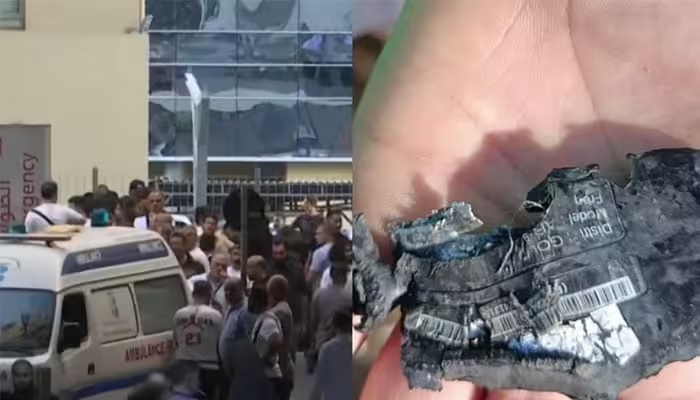A shocking revelation has emerged surrounding the recent series of simultaneous pager explosions in Lebanon, leading to widespread destruction and loss of life. According to Arab media reports, the explosions were part of a covert operation by Israel’s intelligence agency, Mossad, involving the planting of highly destructive chemicals in pager devices used by members of Hezbollah. The explosive material, identified as Pentaerythritol Tetranitrate (PETN), is known for its devastating potential and is commonly used in anti-tank missiles like the Patton missile. The incident has sparked outrage and concerns about the vulnerability of technological devices to weaponization.
The Explosive Chemical PETN
PETN is one of the most potent explosive compounds, and its use in this particular attack reveals the precision with which the operation was executed. Typically used in military applications, PETN is virtually undetectable by conventional security systems, making it an ideal choice for covert operations. In this case, Mossad reportedly inserted small amounts of the explosive material—less than 20 grams—into the pagers, allowing them to be detonated remotely through calls or text messages. This sophisticated method of attack has raised alarm among experts, as the technological manipulation of everyday devices like pagers presents new challenges for national security.
The use of PETN in the pagers highlights Mossad’s reliance on cutting-edge technology and their ability to infiltrate supply chains, as suggested by media claims. These explosive materials are traditionally used in larger military devices such as the Patton anti-tank missiles, but Mossad’s application of PETN in smaller, consumer devices like pagers shows a chilling advancement in tactical operations.
How the Pagers Were Rigged
Arab media sources claim that Mossad had infiltrated the supply chain for the pagers, which had been purchased by Lebanon from Taiwan a few months before the explosions occurred. It is believed that the explosives were inserted into the pagers long before they reached Lebanon, possibly during their production or transit through a third country. The Lebanese authorities have launched an investigation to determine the exact origin of the pagers and whether they passed through other countries before arriving in Lebanon.
One of the most concerning aspects of the attack is that these explosive-rigged pagers were capable of detonating with such precision and coordination. According to Turkish media reports, the pagers operated on radio frequencies, which could be remotely controlled. This means that Mossad had likely hacked the systems and was able to trigger the explosions simultaneously across a wide area, targeting specific individuals within Hezbollah.
The Consequences: Loss of Life and Widespread Injuries
The devastating consequences of the attack were felt immediately. At least eight Hezbollah members were martyred, and more than 2,500 others were injured as a result of the simultaneous explosions. Hospitals across Lebanon were overwhelmed by the influx of injured victims, many of whom sustained serious injuries due to the proximity of the pager explosions. The widespread injuries have placed a significant strain on Lebanon’s healthcare system, which is already grappling with the challenges of the ongoing economic crisis.
The attack has sparked outrage among the Lebanese population, particularly because it targeted individuals associated with Hezbollah. Lebanese officials have condemned the attack, calling it a blatant violation of Lebanon’s sovereignty and a calculated attempt to destabilize the country further.
International Reaction
International reaction to the incident has been swift. While Israel has remained tight-lipped about its involvement in the attack, the United States has categorically denied any role in the incident. U.S. officials issued a statement distancing themselves from the attack, emphasizing that their government had no involvement in the planning or execution of the pager bombings.
In contrast, Israeli media outlets have hinted that the operation may have been a part of Israel’s broader strategy to weaken Hezbollah and disrupt its operations in Lebanon. This would not be the first time Israel has employed covert tactics against its regional adversaries, as Mossad has a long history of using cutting-edge technology and intelligence to carry out targeted operations.
Historical Precedents
This attack is not the first time Israel has used sophisticated methods to target Hezbollah. In 2006, Mossad was accused of a similar operation during the Lebanon War, where remote-controlled devices were used to sabotage Hezbollah’s operations. The ability of intelligence agencies like Mossad to infiltrate supply chains and rig everyday devices like pagers adds a new dimension to the ongoing conflict between Israel and Hezbollah.
The Investigation Moving Forward
Lebanese authorities are now in the process of investigating how these explosives were smuggled into the country and who else may have been involved in this covert operation. One of the key elements of the investigation is determining whether the pagers were altered while still in Taiwan or if they were tampered with after passing through a third country. As Lebanon’s security forces continue their investigation, the incident has raised broader concerns about the security of imported technological devices and the potential for such items to be weaponized in the future.
In the meantime, Hezbollah has vowed to respond to the attack, and tensions in the region remain high. The incident underscores the ongoing conflict between Israel and Hezbollah, where technological warfare has taken on a new, more dangerous form. As investigations unfold, the world watches to see how Lebanon will respond to this violation of its sovereignty and how it will navigate the broader geopolitical implications of the attack.
The simultaneous pager explosions in Lebanon mark a new chapter in the ongoing conflict between Hezbollah and Israel. The use of PETN by Mossad to target individuals within Hezbollah showcases the sophistication of modern warfare, where everyday technology can be turned into lethal weapons. As Lebanon continues its investigation into the attack, the revelations have sparked concern about the vulnerabilities in the global supply chain and the potential for similar tactics to be used in future conflicts.



